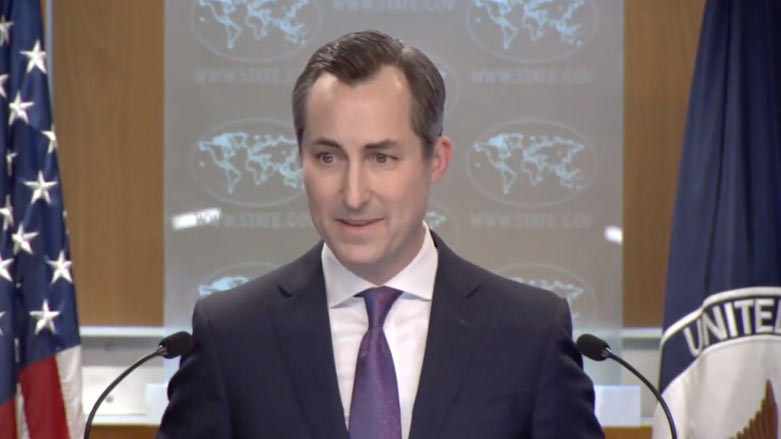U.S. Calls for implementation of Sinjar Agreement

WASHINGTON DC, United States (Kurdistan 24) – The U.S. has, once again, called for the implementation of the Sinjar Agreement, concluded between Baghdad and Erbil in September 2020 to facilitate the Yezidis’ return, after the genocidal assault launched against them in 2014 by ISIS.
It has been nine years since ISIS's assault against the Yezidis, and Britain marked the event on Tuesday by recognizing that campaign as genocide against a religious minority.
Read More: UK government recognizes Yezidi genocide
The British determination was then welcomed by Masrour Barzani, Prime Minister of the Kurdistan Regional Government (KRG.)
Read More: PM Barzani welcomes UK government recognition of Yezidi genocide
In regard to this point, the U.S. was far ahead. Already during the Obama administration, Washington recognized ISIS’s assault on the Yezidis as a genocide.
At a press briefing in March 2016, Secretary of State John Kerry affirmed, “In my judgment, [ISIS] is responsible for genocide against groups in areas under its control including Yezidis, Christians and Shiite Muslims.”
The Trump administration maintained that determination, with Secretary of State Rex Tillerson articulating a similar position, expanding it to include Kurds and even some Sunni Muslims.
"ISIS is clearly responsible for genocide against Yezidis, Christians and Shi’a Muslims in areas it controlled,” Tillerson said in August 2017.
“ISIS is also responsible for crimes against humanity and ethnic cleansing directed at these same groups, and in some cases against Sunni Muslims, Kurds and other minorities,” he added.
The highly-regarded German news magazine, Der Spiegel, in an article based on captured documents, entitled “Secret Files Reveal the Structure of Islamic State,” reported that the core of ISIS was the former Iraqi regime. That would certainly explain its brutality.
ISIS, according to Der Spiegel, was founded in the midst of Syria’s civil war by members of the military intelligence apparatus of the deposed Ba’athist regime.
The late Najmaldin Karim, the Kurdish governor of Kirkuk during the fight against ISIS, told Kurdistan 24 much the same.
Read More: Najmaldin Karim: Islamic State is resurgent, dominated by locals
Karim was careful to limit his remarks to Kirkuk province, which he knew well. He stressed that ISIS in Kirkuk were all local men. They grew beards; switched their pants for dishdashas and shouted “Allahu Akhbar.”
But that, of course, did not make them different people. The ideology was instrumental.
“They’re all local,” Karim said. “Peshmerga fought [ISIS] bravely, and hundreds of them were killed.”
“We have their pictures, their DNA,” and “they’re all from the area,” he concluded.
U.S. Calls for Implementing Sinjar Accord
Asked on Tuesday about the U.S. view of the situation in Sinjar, State Department Spokesperson Matthew Miller described the Sinjar Agreement as “an important and constructive step forward.”
“The lack of implementation and the longstanding political deadlock on the agreement are not acceptable,” he added. “Meaningful progress to implement the Sinjar Agreement is a necessary step to strengthening Iraq’s sovereignty and territorial integrity.”
Miller noted that the U.S. embassy in Baghdad had, earlier that day, “called for officials in Baghdad and Erbil to immediately break the political deadlock by working with Sinjar communities and Yezidi leaders to appoint a mayor in Sinjar.”
Speaking at an event in Baghdad marking the anniversary of the Yezidi genocide, a major Shi’a leader, Ammar al-Hakim, also called for implementing the Sinjar Agreement.
The biggest problem has been lingering insecurity in the area, generated by the presence of militia forces, including the Kurdistan Workers’ Party (PKK), and it would fall to the Iraqi army to take on the PKK and eject it from the area–which falls in northern Iraq and outside of the Kurdistan Region.
Read More: Obstacles to return of Yezidis 'political', says Shiite party leader
In the meanwhile, some 200,000 Yezidis remain as Internally Displaced Persons (IDPs) in camps in the Kurdistan Region.
